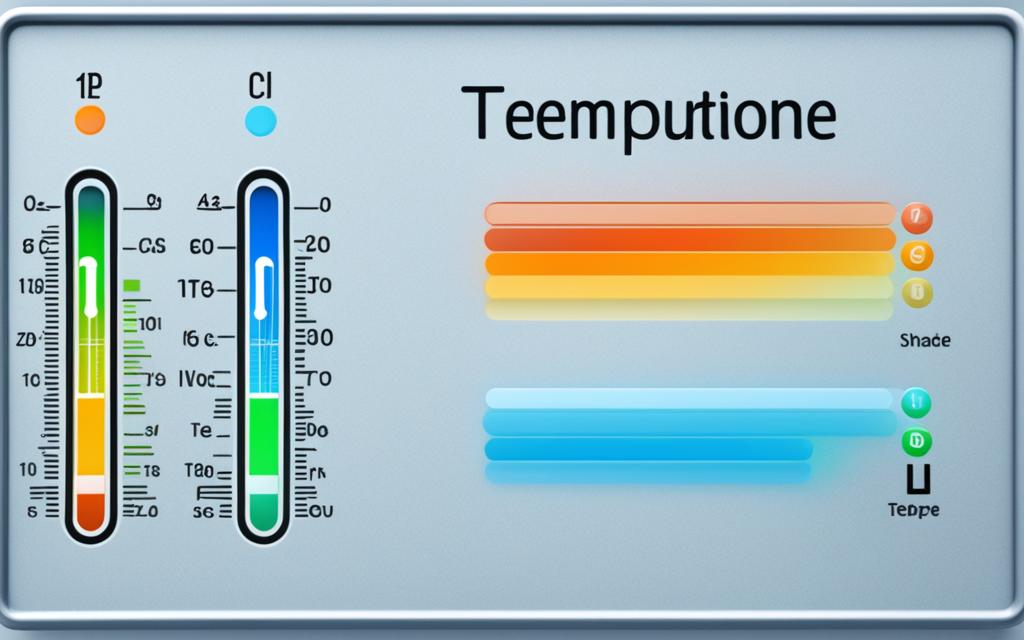Table of Contents
As technology gets better, we talk more about CPU temperatures. Many think 60 degrees Celsius for a CPU is too hot. But, modern CPUs can work well up to nearly 80°C. Knowing about CPU temperatures helps keep your computer running well and for a long time. We’ll look at the temperatures that are OK for CPUs. This helps us understand why it’s important to keep an eye on how hot they get1..
Key Takeaways
- Many modern CPUs can safely operate at temperatures of 80°C or below.
- Maintaining CPU temperatures is vital for enhancing computer performance and longevity.
- Regular monitoring helps in preventing overheating and related issues.
- Awareness of acceptable temperature ranges will aid users in making informed decisions.
- Establishing a good cooling system is essential for maintaining optimal CPU performance.
Understanding CPU Temperatures
Knowing about CPU temperatures helps your system work better for longer. The ideal CPU temperature changes depending on the task and cooling setup. Usually, CPUs work well between 40-60 degrees Celsius for everyday tasks. But heavy use can push temperatures up to 80 degrees Celsius2. Knowing these temperatures helps avoid thermal throttling. This is when the CPU slows down to cool off.
What is the Ideal CPU Temperature?
The ideal CPU temperature is a balance between good performance and safety. CPUs can safely run up to 90 degrees Celsius. Yet, going over 100 degrees Celsius might cause serious harm2. Using good cooling systems is key to keeping temperatures down. CPUs can reduce their speed when too hot to prevent damage.
Factors Influencing CPU Temperature
Different things affect CPU temperature. This includes the CPU type, its cooling systems, and room temperature. High-demand activities like gaming can make the CPU hotter. Also, bad airflow, dust, and poor cooling make heat worse. A case with good airflow and effective cooling keeps temperatures safe and boosts performance.
| Temperature Range (°C) | State of Operation | Risk Level |
|---|---|---|
| 30-40 | Idle | Safe |
| 40-60 | Regular Use | Safe |
| 60-80 | Under Load | Moderate Risk |
| Above 80 | Critical | High Risk – Potential Damage |
| Above 90 | Warning | Very High – Likely Damage | Above 100 | Critical Failure | Immediate Damage Likely |
Understanding these aspects helps control CPU temperature. This improves your system’s performance2.
Is 60 Degrees Celsius Hot for a CPU?
Knowing about 60 degrees Celsius for a CPU is key for their best performance and life. This temp is seen as safe, which lets us understand its role in how well systems work.
Comparative Analysis with Safe Temperature Ranges
CPUs usually stay between 40 to 60 degrees Celsius2 during normal use. When running hard tasks, they can heat up to 80 degrees Celsius2. Staying within 70 to 80 degrees under heavy use helps keep things running smoothly without hurting the hardware3.
While 60 degrees is okay, going over 80 can lead to thermal throttling. This slows down the CPU’s speed and affects its working2.
Impact on Performance and Longevity
The link between temperature and how well a CPU works is clear. Being too hot for too long can harm it by causing thermal throttling. This might also shorten its life3.
Modern CPUs protect themselves from getting too hot. Still, keeping them under 80 degrees is wise for keeping up performance2. Good cooling helps extend a CPU’s life while keeping performance steady over time.
Common Causes of High CPU Temperatures
Understanding the causes of high CPU temperature is key to managing it well. There are many factors that cause high CPU temperatures. Identifying and tackling these promptly is important.
Dust Accumulation and Poor Ventilation
Dirt accumulation is a huge problem. Dust gathers inside the computer, blocking fans and air paths. This makes it hard for cooling systems to get rid of heat, making the CPU hotter. Ventilation problems make it worse by keeping the heat trapped.
Cleaning regularly helps keep the air flowing well. This reduces the chance of the computer overheating. For ongoing high temperatures, it’s good to look at related discussions for more help.
Inadequate Cooling Solutions
Many computers don’t have good enough cooling to manage heat. Cheap heatsinks and fans, or old thermal paste, don’t move heat away from the CPU well. When the CPU gets too hot, it can slow down or get damaged. CPUs work best between 60°C to 70°C. Above 80°C can cause problems3.
Fixing this often means putting on new thermal paste and maybe getting better cooling. This stops the computer from getting too hot, especially when it’s working hard.
Overclocking Effects on Temperature
Overclocking makes the CPU run hotter than usual by making it work faster. This can lead to too much heat and potential damage. Even CPUs made for overclocking need close watching to keep them stable4.
Using temperature tools to watch the CPU helps keep it running right. This way, you can make sure it stays cool enough to work well.
Best Practices for Maintaining Optimal CPU Temperature
Managing CPU temperatures well ensures they last longer and work better. By adopting smart CPU maintenance routines, one can greatly reduce overheating risks. This keeps the system stable.
Regular Cleaning and Maintenance
Making cleaning practices a habit is important. Dust can block airflow inside the case, causing temperatures to rise. By cleaning regularly, the cooling system works more efficiently. This results in better CPU temperature management.
Upgrading Cooling Systems
If you’re demanding a lot from your system, consider cooling system upgrades. High-end CPUs get hot, especially when overclocked. You can choose between cooling options like the Arctic Liquid Freezer II 420 and the Scythe Fuma 2. Both offer excellent cooling to keep temperatures low under heavy load5.
Good cooling systems help keep temperatures within safe limits. This improves the system’s stability and how well it performs.
Monitoring CPU Temperatures Effectively
CPU temperature monitoring is crucial to avoid overheating. Tools like Core Temp or infrared thermometers allow for tracking temperatures in real-time. Checking regularly can spot temperature rises early. This means you can act quickly to prevent damage6.
By taking early action, you ensure a stronger and more efficient computing experience. This boosts performance for tasks that need a lot of resources6.
Conclusion
CPU temperatures can be tricky. While 60 degrees Celsius is a bit high, it’s still within safe limits for short periods. Most CPUs work best at 30 to 50 degrees Celsius. If they’re hotter for too long, they might slow down because of thermal throttling7. Keeping your CPU cool is vital. Using fans and heatsinks helps get rid of extra heat. This lets your CPU work its best8.
To make sure your CPU stays cool, regular maintenance is key. Cleaning your computer and applying thermal paste can improve how well it stays cool. It’s also important to follow what the manufacturer says about temperature. They recommend keeping the CPU below 50 degrees Celsius for the best performance9. By doing these things, you can keep your computer running smoothly. This way, you avoid damage and get the most out of your computing experience.
FAQ
What is considered a normal temperature for a CPU?
A CPU’s normal temperature is between 30°C and 40°C when not busy. When working hard, the ideal temperature is between 60°C and 70°C.
What should I do if my CPU temperature exceeds 80°C?
If your CPU often goes over 80°C, you need to look into cooling problems. Enhance airflow or get a better cooling system to stop overheating and protect its performance.
How does dust accumulation affect CPU temperatures?
Dust can block cooling fans and air paths. This makes it hard for your CPU to get rid of heat. This can lead to higher temperatures and could slow down your computer.
Can overclocking a CPU lead to higher temperatures?
Yes, overclocking makes a CPU work faster, creating more heat. It’s important to watch the temperature closely when overclocking to avoid overheating and damage.
What are some effective cooling solutions for CPUs?
Good cooling options include top-notch air coolers and liquid cooling systems. Keep your computer case’s air moving well. Cleaning and changing thermal paste regularly also helps keep things cool.
How can I monitor my CPU temperatures?
You can use programs like Core Temp or tools like infrared thermometers to check your CPU’s temperature. Watching your CPU’s heat helps you take action early if it gets too hot.
Why is it important to maintain optimal CPU temperatures?
Keeping your CPU at the right temperature helps avoid slowing it down and makes it last longer. CPUs that stay too hot can lose performance and might get damaged over time.
Source Links
- https://medium.com/@info.pcguidetoday/is-60-degrees-celsius-hot-for-a-gpu-explained-in-details-d9ae31df09b6 – Is 60 degrees Celsius Hot For A GPU? Explained In Details
- https://community.spiceworks.com/t/what-is-a-normal-temperature-for-a-cpu-and-how-do-i-keep-it-low/948818 – What is a normal temperature for a CPU and how do I keep it low?
- https://www.noyafa.com/blogs/knowledge-base/good-cpu-temperature – What Is A Good CPU Temperature? A Guide to Keep Your Processor Cool
- https://www.avast.com/c-how-to-check-cpu-temperature – How to Check and Monitor Your CPU Temperature
- https://primetechsupport.com/blogs/gaming-pc-repairs/choosing-the-right-cpu-cooler-keep-your-gaming-pc-cool – Choosing The Right CPU Cooler: Keep Your Gaming PC Cool
- https://www.overclock.net/threads/acceptable-component-temperatures-under-liquid-cooling.1808065/ – Acceptable Component Temperatures under Liquid Cooling
- https://softwareg.com.au/blogs/computer-hardware/is-60-degrees-celsius-hot-for-a-cpu – Is 60 Degrees Celsius Hot For A CPU
- https://softwareg.com.au/blogs/computer-hardware/cpu-at-60-degrees-idle – Cpu At 60 Degrees Idle
- https://directmacro.com/blog/post/what-is-optimal-cpu-and-gpu-temp – What Is Optimal GPU Temp and CPU Temperature Range












